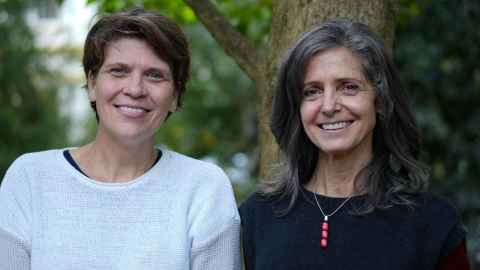Researchers help Tairāwhiti lift its voices
3 October 2025
University of Auckland researchers helped form a Tairāwhiti Citizens' Assembly, whose bold calls for action are being heeded.

University of Auckland's Complex Conversations Lab co-directors Dr Anne Bardsley and Dr Kristiann Allen helped the cyclone-battered Tairāwhiti community form a citizen’s assembly.
The group has tackled tough questions about erosion-prone land on the East Coast and made calls for action to make the region more resilient to the impacts of climate change.
A cross-sector Transition Advisory Group has incorporated many of the assembly’s calls for action into its business case for land that is vulnerable to slips.
It agreed that restoring native forest was the best option for the most erosion-prone land, says Bardsley.
On 2 October, the business case was endorsed by Gisborne District Council.
The citizens' assembly includes about 40 people aged from their 20s to their 70s, who were randomly selected in a process designed to ensure the group would reflect the community.
It has representatives of tangata whenua, tau iwi, and residents from urban and rural areas, say Bardsley and Allen, who are involved with Ngā Ara Whetū – Centre for Climate, Biodiversity and Society at the University.
After hearing from experts, stakeholders and mana whenua, then sharing ideas online and in person, the group has made calls to action for the government, Gisborne District Council, Trust Tairāwhiti, and Tairāwhiti Transition Advisory Group.
“We’ve explored the mamae (pain) of decisions made from afar, choices that encouraged land uses and practices that have not honoured the shape, spirit, or strength of our whenua,” the assembly writes in its calls to action.
“We have seen the toll these decisions take: slips scarring the land, awa choking with debris, and the heavy weight carried by our whānau, especially in the face of a more challenging climate.”
The assembly is calling for bans on clear-fell forestry on erosion-prone land and on intensive land uses that accelerate environmental degradation.
Bardsley says cyclones Hale and Gabrielle in 2023 hit soon after pine forests had been clear-felled.
Heavy rain caused slips on the recently cleared land, while forestry slash washed into rivers, damming them and causing floods and erosion of riverside land.
Decades of forestry and farming have increased sedimentation of rivers, raising riverbed levels and exacerbating flooding.
Beaches were strewn with huge swathes of woody debris washed down from forestry blocks, says Allen.
A Ministerial Inquiry into Land Use was launched in response to the devastation caused by the cyclones.
The council then formed the Transition Advisory Group to develop guidelines for shifting erosion-prone land into permanent forest.
The assembly is calling for environmental restoration to be prioritised above commercial returns, saying the health of the land and waterways should be central to decision making.
It wants native trees to be planted where possible on erosion-prone land on the East Coast.
The assembly also wants the government to incentivise native forest regeneration, rather than pine forestry, through a biodiversity credit scheme.
We’ve explored the mamae (pain) of decisions made from afar.
Decisions about Tairāwhiti should be made by the people who live there, with Te Tiriti o Waitangi offering a stronger framework for shared leadership in the region, which has a high population of Māori, the assembly says.
The assembly has also made submissions on proposed changes to government policies, such as the Resource Management Act and National Environmental Standards for Commercial Forestry.
Local group Te Weu Tairāwhiti initially approached Allen and Bardsley, asking them to help the community take the lead on climate change adaptation.
Expertise to inform the group was provided by Tairāwhiti resident and University of Auckland Distinguished Professor Dame Anne Salmond and Associate Professor Dr Jon Tunnicliffe, colleagues from Victoria University, Waikato University, Manaaki Whenua – Landcare Research, Pure Advantage Aotearoa, and other organisations.
Allen and Bardsley say many people in Tairāwhiti remember the effects of Cyclone Bola in the 1980s and were traumatised by cyclones Hale and Gabrielle in 2023.
The cyclones two years ago caused several fatalities, left roads and bridges broken, and cut off power and communication.
“After Cyclone Bola the government incentivised pine forestry to try to stop the land from slipping, but it actually made things worse,” says Bardsley.
“Pine roots don’t hold the land as well as native trees and clear felling of pine forests contributed to the slips.
“Planting pine monocultures mostly made money for multinational forestry companies, but in the end led to massive economic costs to residents, ratepayers and taxpayers.”
Bardsley and Allen have now stepped back from the Tairāwhiti Citizen’s Assembly, but the group continues to campaign for change driven by local needs.
The researchers are encouraged by the impact of the project.
“It has helped shed light on approaches to deliberative democracy tailored to the unique context of Aotearoa,” says Allen.
Listen to the Ingenious podcast to learn more about how the University of Auckland is driving changes to the way democracy works by creating citizens' assemblies.
Media contact
Rose Davis | Research communications adviser
M: 027 568 2715
E: rose.davis@auckland.ac.nz